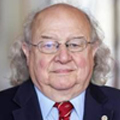The IMF and the Future of International Monetary and Financial Cooperation
Ministry of Economy and Finance, Rabat
By Edwin M. Truman, Non-Resident Senior Fellow, Peterson Institute for International Economics
For almost 75 years, the International Monetary Fund has been at the center of the post-World War international monetary system. The institution has evolved as the global economy has been transformed politically and economically. As with other international institutions, the IMF and its position in the center of the system are now under threat from potential neglect by the Trump administration and from competition from China as the principal rival to US domination of the Bretton Woods system. For example, the US Secretary of the Treasury Steven Mnuchin has stated that the IMF has adequate financial resources, implying that the review of IMF quotas that is to be completed by the end of 2019 need not add further to IMF resources, even though some of the IMF’s current resources will be unavailable after 2020. If IMF quotas are not increased, the governance of the IMF will remain static, frustrating the dynamic emerging market economies.
Policy implications. First choice: If the United States does not want to participate in a further expansion of IMF quota resources, it should step out of the way while other countries do so. Second choice: If the United States blocks a further expansion of IMF quotas, other countries will need to provide renewed and preferably expanded bilateral lending to the IMF to preserve its role in the center of the system. Third choice: If other countries do not want to renew and expand their bilateral lending to the IMF, they under Chinese leadership will be tempted to establish new institutions for either regional or global lending operations, thus weakening the role of the IMF at the center of the system.
Keep me informed-

Edwin M. Truman
Edwin M. Truman, nonresident senior fellow since July 2013, joined the Peterson Institute for International Economics as senior fellow in 2001. Previously he served as assistant secretary of the US Treasury for International Affairs from December 1998 to January 2001 and returned as counselor to the secretary March–May 2009. He directed the Division of International Finance of the Board of Governors of the Federal Reserve System from 1977 to 1998. From 1983 to 1998, he was one of three economists on the staff of the Federal Open Market Committee.
Truman has been a member of numerous international groups working on economic and financial issues, including the Financial Stability Forum's Working Group on Highly Leveraged Institutions (1999–2000), G-22 Working Party on Transparency and Accountability (1998), G-10-sponsored Working Party on Financial Stability in Emerging Market Economies (1996–97), G-10 Working Group on the Resolution of Sovereign Liquidity Crises (1995–96), and G-7 Working Group on Exchange Market Intervention (1982–83). Truman has also been a visiting economics lecturer at Amherst College and a visiting economics professor at Williams College. He has published on international monetary economics, international debt problems, economic development, and European economic integration. He is the author, coauthor, or editor of Sovereign Wealth Funds: Threat or Salvation? (2010), Reforming the IMF for the 21st Century (2006), A Strategy for IMF Reform (2006), Chasing Dirty Money: The Fight Against Money Laundering (2004), and Inflation Targeting in the World Economy (2003).









